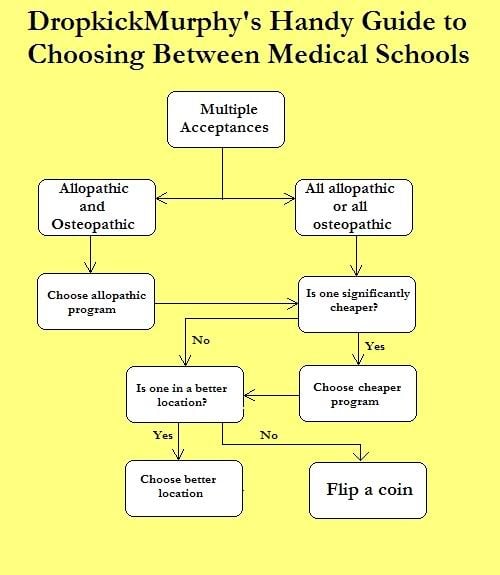Excellent post.
I choose MD over DO because of cost (got into my instate school and I get to live at home) but also because I had read up on some of the extra hurdles that DO may have to undergo for medical licensing.
The thing is, being a medical minority have some drawbacks, mostly institutional and related to residency/fellowship training, so I figured, unless the DO school gave me some 'extra' perks that outweighed the issues I would have to put up with as a DO in training, I would pick the MD over DO. I'm not adament about getting the DO, I just wanted to be a doctor, so I picked the degree that would get me to my goal in the least painful way. For some people, that may mean location, costs, philosophy, 'right feel'. For me, it was licensing and training (not taking two board exams, finding DO friendly hospital rotations etc). But I guess I was fortunate to have financially supportive parents, no family/dependents to worry about, so I could have moved anywhere and only had to consider the actual education offered other than these other extraneous factors.
Also, rotations at many DO schools are not as nicely structured. I did some research and only accepted schools which had a structured clinical years. The above poster mentioned licensing as an issue, but I found that some Do schools also dont' have a teaching hospital close by for students. They farm out their students to other places to do rotations. I didn't like the idea of moving two years after med school, and I especially didn't like that some schools made you do rotations at different locations throughout your two clinical years (all that moving!). More allo schools will have a medical hospital on campus for students to rotate through than osteo schools. There are some perks to the rotation system of osteo schools, some people get to move back to their families to do rotations, others like to experience multiple hospitals etc. However, I thought it was a hassle, and I suggest students look through this carefully and make sure the benefits outweigh the perks. I knew a student at a DO school that had to drive several hours every month during his clinical years back to the main campus to do his exams. That's just too much of a pain for me.

So, while I know that it's not a popular thing to say on the forum, but I would try to pick an allo school simply for the benefits that goes with being a 'medical majority', if the location/costs/nonacademic reasons were fairly equal (or even a little bit less than equal). Also, allo schools can do the 'holistic' medicine. I'd say that my school is pretty gung ho about it. The only thing missing is the OMM, but it's not a big deal to me. If OMM is a huge thing, DO is definitely a better place to learn it!
I have gone thruogh the process of applying to both allo and osteo and I did some fairly extensive research into the curriculum of the two schools. While I think both can produce good doctors, I just find that, given a MD majority world, it was easier to get the MD than the DO, but I have met students who had other considerations for doing DO and they are perfectly content with their choice.


